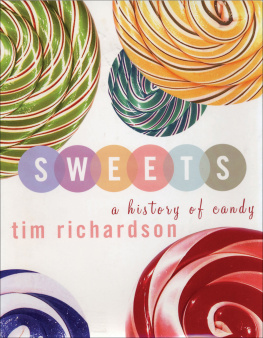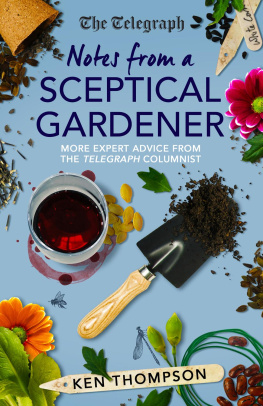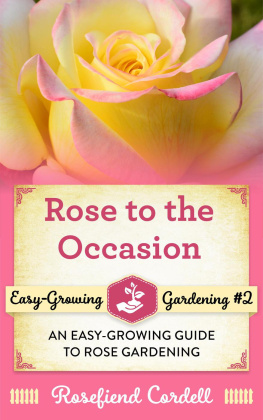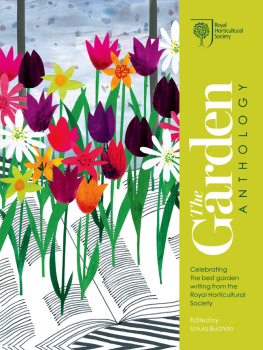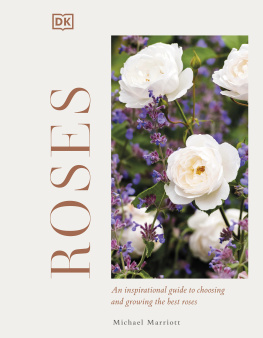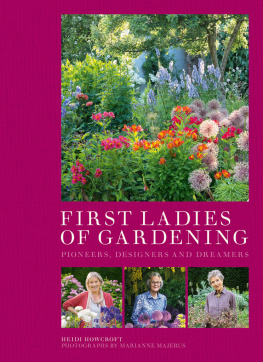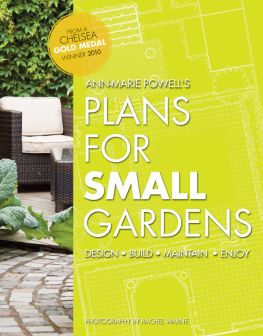Of Rhubarb and Roses

The Telegraph
BOOK OF THE GARDEN
Edited by Tim Richardson

First published in 2013
by Aurum Press Ltd, 7477 White Lion Street, London N1 9PF
www.aurumpress.co.uk
eBook conversion by CPI Group
This eBook edition first published in 2013
All rights reserved
Copyright 2013 Telegraph Media Group Limited
Introduction Copyright 2013 Tim Richardson
All works were originally published by the Telegraph Media Group Limited with the exception of Why I hate gardening from The Bad-Tempered Gardener by Anne Wareham. Published by Frances Lincoln Ltd. 2011. Reproduced with permission from Frances Lincoln Ltd. and Anne Wareham. A study in scarlet and Secrets of the magic mollusc reproduced with kind permission from Germaine Greer.
The right of Tim Richardson to be identified as the Editor of this work has been asserted under the Copyright, Designs and Patents Act 1988
This eBook is copyright material and must not be copied, reproduced, transferred, distributed, leased, licensed or publicly performed or used in any way except as specifically permitted in writing by the publishers, as allowed under the terms and conditions under which it was purchased or as strictly permitted by applicable copyright law. Any unauthorised distribution or use of this text may be a direct infringement of the authors and publishers rights, and those responsible may be liable in law accordingly
ISBN 9781 78131 145 5
Contents
Introduction

W hat to expect, trawling through every piece of garden writing in the Daily Telegraphs history?
Im not sure quite what I was anticipating, but I know it was not diatribes against melon frapp or the best places to find wild chives on the Lizard peninsula. Im not sure, either, that I was quite ready for the fact that a garden column appeared in the newspaper every single day from the late 1950s on. The result was bulging file after file brought up from the Telegraphs distant archive, each filled to bursting with carefully snipped clippings. Snow, drought, storm, new plants launched, old plants rediscovered, the latest furore at the Chelsea Show the garden columnist falls upon everything that makes one year different to the last, for with a cyclical subject such as horticulture there is the ever-present danger of repeating oneself. The Telegraphs writers have avoided this for the most part, though I was amused to come across at least four versions of a May I introduce you to euphorbias? piece by the same author. One of the fascinations of gardening is the way the same issues arise year after year while always seeming different, somehow perhaps because of the vagaries of the seasons.
Then there are the news stories, deferential in earlier days Duke of Norfolk Wins Gold Medal at RHS Show (1961) rather more sensational later: Conflict Among the Marrows (1984). In more recent years the daily columns have been replaced by a Saturday gardening supplement which has become required reading for keen horticulturists, the repository of a wide range of writing on the topic. This variety is in part simply the result of more space being available: once the what to do in your garden this week and question-and-answer areas are taken care of, there is an opportunity for writers to venture into more specialist horticultural topics and newsworthy items, as well as garden design and history, opinion and comment. It is the latter topics which have proven the most fruitful breeding ground for the plums picked for this anthology writing that is idiosyncratic, original, piquant or esoteric.
The Telegraphs first regular garden writer was H. H. Thomas, who was a well-known horticulturist in his own right. He contributed the odd news story through the 1930s and in 1937 he was given a regular column. The war put paid to this in fact, there was hardly anything about gardens printed in the paper during the war years, a reminder of quite how grim it was and the column did not commence again until 1953. Gordon Forsyth took over the year after and in the late 1950s he was joined by Fred Whitsey, who can fairly be described as the doyen of Daily Telegraph garden writers, contributing by far the most in terms of pure wordage, right up until his death in 2009. From the 1950s until the 1990s the stable of Telegraph garden writers remained small, with Gordon Forsyth and Robert Pearson notable for their reliability and down-to-earth good sense, Denis Wood for his connoisseurial bent, and Fred for his range of interest and extraordinary (I use the word advisedly) ability to add a fresh spin to well-worn horticultural topics. He was as happy discoursing on the gardens of the Italian Riviera as he was on how to hold a spade properly; in that sense he was perhaps the model for the modern garden writer. The tyranny of the daily column can lead to a kind of madness, however, as the writer desperately casts around for new ways of expressing himself. I have included here one of the most remarkable instances of this: Freds 1967 column on compost, which begins with him on the masseurs couch, of all places, and concludes with a (favourable) comparison between the lore of manure and the work of George Bernard Shaw.
I used the word himself just then, and some will have been pulled up by it, understandably enough. But the fact is, the Telegraphs garden writers were all male until the 1980s, which is perhaps reflective of the times. In fact, the tone and content of the garden journalism in the newspaper is a good touchstone for the way gardening has changed over the years. (By the way, as a matter of policy I have not edited out references to chemicals which are now illegal, or excised recommended nurseries which are now defunct, on the grounds that such references are redolent of the times. Also, in the interest of authenticity, I have retained plant names as they existed at the time of publication some will have changed since, but interested readers will be able to identify any new names via the internet.)
From the 1950s to the 1970s, many of the columns exhibit rather a man-to-man attitude, with advice on lawn care, the use of chemicals, pruning, double-digging and other physical work along the lines of jobs for the weekend. Sometimes there is even a feeling that the reader is being ordered about; that a smooth and weed-free lawn is every Englishmans duty and that the list of jobs really ought to be ticked off as completed unless one is at deaths door. The best writers tend to leaven this potential tyranny of the reader with a little humour, however, or with a frank admission of their own failures and shortcomings.
At this time the aesthetics of the garden were either incidental or couched in terms of plants that are worthwhile, rewarding or good value, with the emphasis strongly on shrubs. Herbaceous perennials, which have come to dominate garden writing today, were seen almost as fripperies, companion plants to shrubs that were only worthy of noting in group lists of up to a dozen. A whole column on campanulas, for example, was a rarity indeed at this time. Trees were another popular topic also an area of horticulture traditionally favoured by men. Gardening was much more about the broad sweep, as opposed to the fine detail, and it is noticeable how much smaller the range of plants then being discussed was, compared with the ever-expanding range of flowers with which todays serious gardener is expected to be familiar.



